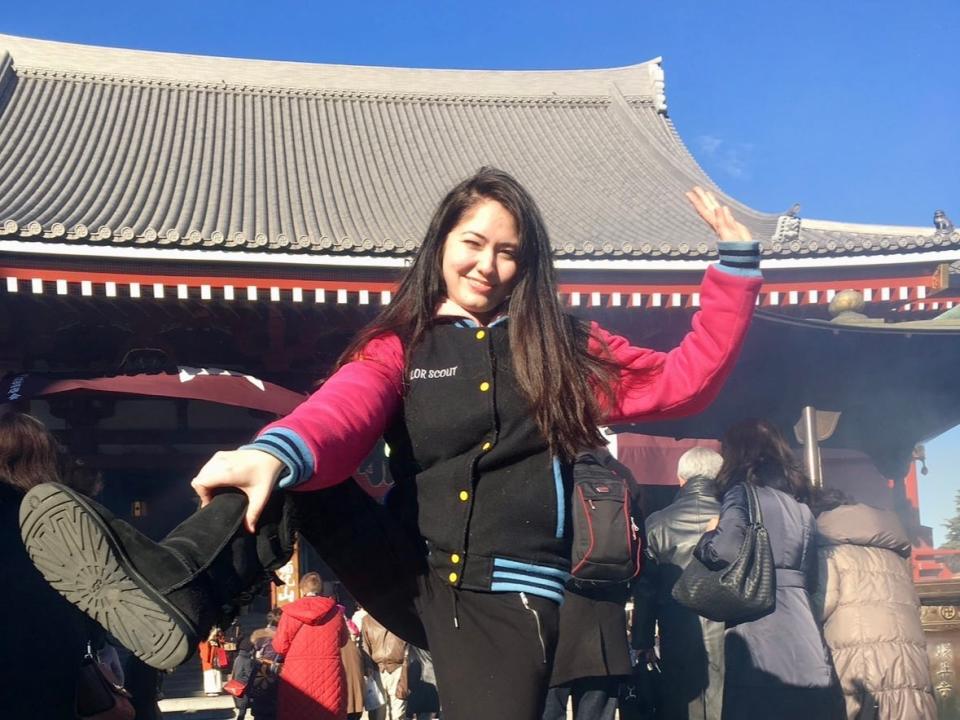I went to Japan for a 3-week holiday. It's been 7 years, and I'm not coming back to the US anytime soon.
Arianna Caiazzo went to Japan for a holiday after dropping out of college.
Despite the challenges, Caiazzo now calls Japan home.
She says life in Japan is more affordable and she feels safer.
This as-told-to essay is based on a conversation with Arianna Caiazzo, 27, who moved to Japan in 2017. This essay has been edited for length and clarity. Business Insider has verified her salary and expenses.
My life in Japan started as a holiday.
I dropped out of college at 19 in my second year. My major in English at Arcadia University in Pennsylvania didn't seem like the right fit. I wanted to transfer to fashion school, but I missed the application deadline.
I had been fascinated with Japan for a long time, especially its Harajuku fashion, which is really colorful and artistic. After years of being depressed and dressing up in all black, Harajuku fashion became a way for me to express my joy. I was dressing up with rainbow-colored braids and rainbow makeup.

With fashion as a big pull factor, I decided to go to Japan for a three-week trip. My parents thought, "She's not going to make it; she's going to come home crying."
I spent my three weeks there doing all the touristy things. I had never been on my own before. I was traveling around Tokyo and hitting all the clubs — being able to drink at 19 without being carded was new.
After the first three weeks, I asked my parents if I could stay another three weeks and slowly kept extending my time. I loved the culture in Japan. I felt comfortable — no one was looking at me, no one was talking to me or bothering me.
Three months in, I called my parents again and said, "I want to live here."
One of the hardest things I've done
Before I temporarily left for the US to get a longer visa to stay in Japan, I picked a language school and a vocational school I wanted to enroll in to study fashion.
Attending language school in Japan was one of the hardest things I have done. I was the only person who wasn't Asian, and I was alone all the time because the other students all spoke Chinese, Vietnamese, or Korean.
The learning environment was harsh — teachers screamed at us and were allowed to pour water on us. They would berate me, telling me I had gained weight or saying my hair color was ugly. I started having panic attacks.
Two years later, I enrolled into fashion school, which was a different wild ride.
Schoolwork was tough. We were creating and submitting one outfit per week. My classmates were passing out from not sleeping all week and working all night long. I was completely burned out by the time I graduated in 2023.
Here, I am in a state of ease

Despite the challenges I faced in both schools, I was having an amazing time outside class. I love the food, and the friends I have made are my family at this point.
I especially appreciate the safety. Back home in New Jersey, I always felt scared anytime I was home alone. Here, I am in a state of ease.
Japan's convenient public-transportation system was another big plus point because I hated driving back home.
Life here also feels a lot more affordable. I can spend $20 for a huge amount of groceries. I am still shocked that 20 eggs cost $2.
Living with ADHD and Autism
I was diagnosed with ADHD and Autism after I moved to Japan. ADHD medication is easily accessible here. I have to take five medicines, which only add up to about $100 per month in Japan.
My treatments are also cheaper — I went for eight transcranial-magnetic-stimulation sessions in the span of one month, which was recommended for my symptoms. A set of treatments in the US would be $6,000. I pay $2,000 in Japan.
I currently live in Osaka and am renting an apartment with my boyfriend of four years. I teach English and math to 6- to 8-year-olds at an after-school service. I work three hours a day, which makes the job more accessible with my health conditions than a career in fashion would be.
My job pays me 3,000 Japanese Yen, or about $20, an hour. I am able to make about $1,340 a month, which is the same as I would get paid for an entry-level fashion job.
My rent is 300,000 Japanese Yen, or about $2,020 a month. My boyfriend and I split two-thirds of the rent evenly, and his company pays for one-third of it.
I am currently a bit hesitant to rejoin the fashion industry, but if, in the future, I am able to better manage my symptoms and am feeling creative again, I hope to pursue fashion again.
Even as a foreigner, I feel right at home in Japan and have no plans to move back.
Read the original article on Business Insider


